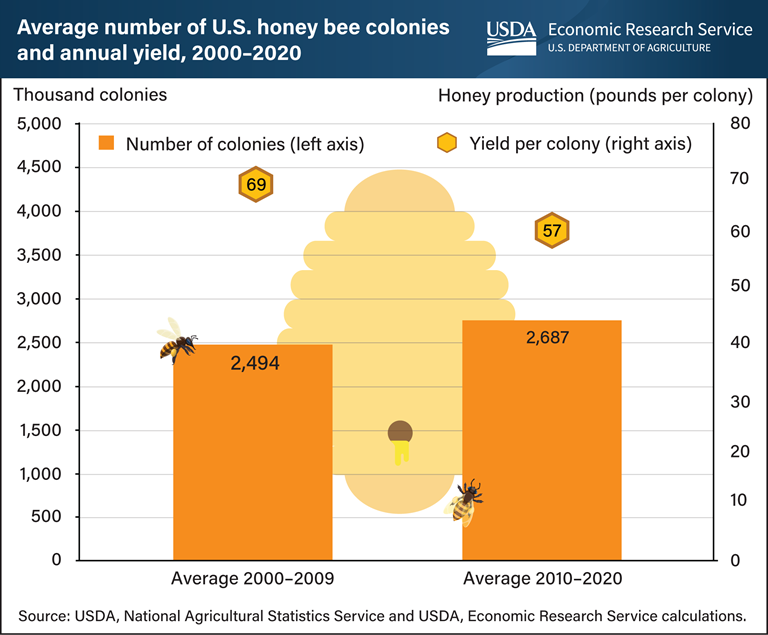

The number of honey bees that visit the flowers on our property seems to have gone way up the last decade.
In 2006, bees across the U.S. started dying rapidly. Now, the U.S. honey bee population is at an all-time high, according to the Census of Agriculture. Clay Bolt, manager of pollinator conservation for the World Wildlife Fund U.S., joins CBS News to explain what happened.
May 13, 2024
https://www.cbsnews.com/video/us-honey-bee-population-reaches-record-high/
https://www.axios.com/2024/03/29/us-bee-farms-increase
There could be a record number of bee farms in the U.S. right now, according to a new analysis from the Washington Post.
Why it matters: Unusually high hive losses in the early 2000s ignited fears that the domesticated western honey bee, an integral part of the world's food system, was headed for widespread population collapse from pesticide, climate change and invasive mites.
By the numbers: A 2022 census by the USDA's National Agricultural Statistics Service suggests more than 1 million honey bee colonies have popped up around the U.S. since 2007, making them the fastest-growing type of livestock in the country, the Post reports.
Honey Bee Colonies
ISSN: 2470-993X
Released August 1, 2023, by the National Agricultural Statistics Service (NASS), Agricultural Statistics Board, United States Department
+++++++++++++++++
https://www.youtube.com/watch?v=v-CTT5NivoE
++++++++++
Jun 29, 2023 8:00 am
https://news.illinois.edu/view/6367/787572990
A new report reveals that U.S. beekeepers lost roughly half of the honey bees they managed last year. University of Illinois Urbana-Champaign entomology professor Adam Dolezal, who studies how environmental stressors affect honey bees and wild bees, spoke to News Bureau life sciences editor Diana Yates about the current status of bees in the U.S.
Honey bee populations have been faltering since at least 2006. Why can’t scientists and the beekeeping community address and solve whatever is causing the massive die-offs?
+++++++++++
The moral of this story is.........Don't believe everything you read on the internet, especially when the sources have a preferred narrative or disguise their activism by spinning their interpretations or CHERRY PICKING.
My backyard represents .00000000001% of the honey bee population but I started this thread because of being shocked at the high number of honey bees in our backyard recently.
What are the chances that the honey bee population is dying off...........but increasing this much in my backyard?
The USDA actually reports on this!
https://usda.library.cornell.edu/concern/publications/hd76s004z?locale=en
Honey
ISSN: 1949-1492
Released March 15, 2024, by the National Agricultural Statistics Service (NASS), Agricultural Statistics Board, United States Department of Agriculture (USDA).
United States Honey Production Up 11 Percent in 2023
United States honey production in 2023 totaled 139 million pounds, up 11 percent from 2022. There were 2.51 million colonies producing honey in 2023, down 6 percent from 2022. Yield per colony averaged 55.2 pounds, up 17 percent from 2022. Colonies which produced honey in more than one State were counted in each State where the honey was produced.
Therefore, at the United States level yield per colony may be understated, but total production would not be impacted.
Colonies were not included if honey was not harvested. Producer honey stocks were 44.0 million pounds on
December 15, 2023, up 90 percent from a year earlier. Stocks held by producers exclude those held under the commodity loan program. Honey Prices Down 16 Percent in 2023
United States honey prices decreased 16 percent during 2023 to $2.52 per pound, compared to $3.01 per pound in 2022. United States and State level prices reflect the portions of honey sold through cooperatives, private, and retail channels. Prices for each color class are derived by weighting the quantities sold for each marketing channel. Prices for the 2022 crop reflect honey sold in 2022 and 2023. Some 2022 crop honey was sold in 2023, which caused some revisions
to the 2022 crop prices.
Price Paid per Queen was 19 Dollars in 2023
The average prices paid in 2023 for honey bee queens, packages, and nucs were $19, $91, and $120, respectively. Pollination income for 2023 was $255 million, up 6 percent from 2022. Other income from honey bees in 2023 was $57.7 million, up 5 percent from 2022. These estimates, along with expenditure and apiary worker information, can be
found on page 4 of this report.
https://www.ers.usda.gov/data-products/chart-gallery/gallery/chart-detail/?chartId=102065

Bottom line is that the US honey bees are doing just fine, thanks to bee keepers!
And then, there's always this:

Be the solution to help protect bees in crisis
https://www.greenpeace.org/usa/
++++++++++++++++++++
As an environmentalist, I understand some of their positions.......but I'm also an independent, objective scientist that uses REALITY not absurd, zealot idealism that often lacks sound science and practicality.
They promote ORGANIC FARMING to save the bees.
We have a few farmers here that can tell us what a joke that would be for COMMERCIAL farming.
Just let the weeds compete and bugs eat our crops and diseases compromise their health/productivity.
Getting rid of synthetic fertilizers that use fossil fuels for production in commercial farming operations(because of the fake climate crisis-greening up the planet with beneficial CO2) would reduce global food production for humans by 50%.
Save the Humans!
Not only with food for the body but authentic food for the mind, NOT PROPAGANDA!
DeathbyGREENING!
40 responses |
Anothersecret about fossil fuels: Haber Bosch process-fertilizers feeding the planet using natural gas-doubling food production/crop yields. September 2019
https://www.marketforum.com/forum/topic/39215/
There are certainly ways to LESSEN unnecessary damage to the environment, like reducing agricultural fertilizer runoff into streams that send it to other places, where it does things like cause "dead zones".
Therealenvironmental crisis's
30 responses |
Started by metmike - April 10, 2019, 7:11 p.m.